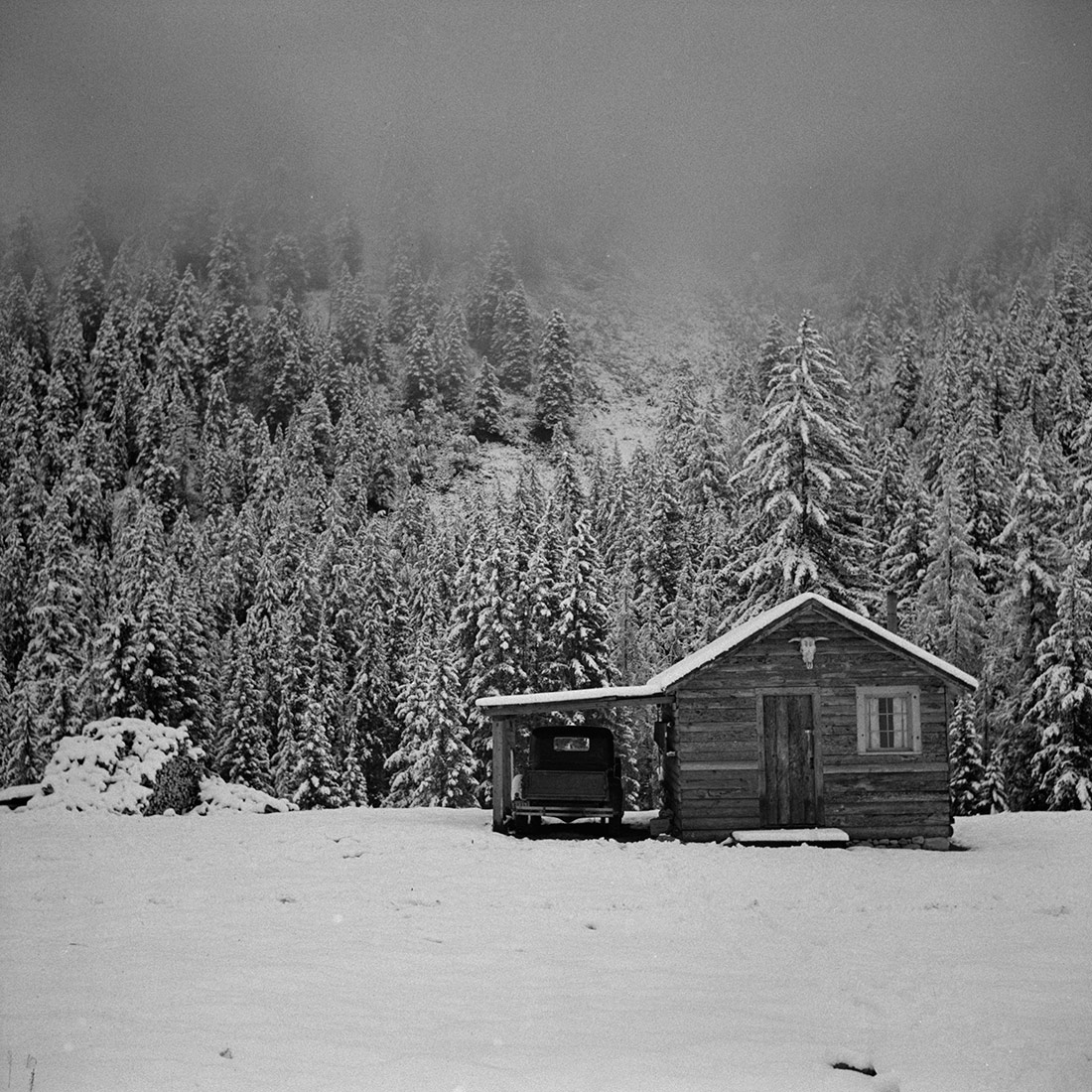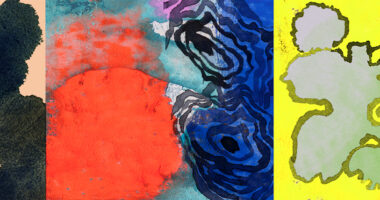
Cowhands’ cabin on ranch after early fall blizzard in mountains near Aspen, Colorado, 1941 | Marion Post Wolcott, Library of Congress | Public domain
A house is more than just a building. It gives us protection and security, but it can also enclose shadows and mysteries. Whether we are talking about a humble hut or the whole planet, the idea of home can offer a starting point (or point of return) for thinking about our world. This is the first in a trilogy of articles inspired by the quote from Michel Serres: “Planet: laboratory, habitat and altar!”
Looking around my house, I was startled and somewhat appalled to realize how little I knew about the domestic world around me.
Bill Bryson. At home
Homes of fire
In Spanish, the etymology of the word hogar, or “home,” can be traced back to the Latin word focus, which originally referred to the fire used for heating and cooking in a dwelling, but which also refers to that on which we hone our attention. Primordial fire, cognitive focus, where we could imagine the origins of human life on planet Earth in a story that is both consensual and at the same time adulterated, as if we could know with certainty what happened in the homes of the remote past.
Gathered around the fire, the first tribes, clans or proto-families, with tasks that we imagine to be clearly defined, in such a way that the male hominids had to provide food, going forth into the mysterious outdoors full of enigmas, dangers and challenges. In the imaginary cave, the female hominids would be left to take care of the small hominids, striving to keep the fire alive, reflecting on the advantages of inventing utensils with various functions, with precarious materials. The male hominids might not return because they could be devoured by some ominous creature, they could fall into an unfathomable pit or simply decide not to return, with a degree of primordial cowardice and irresponsibility already sensed by the female hominids thousands of years previously. The story could develop by focusing our attention on the adventures and misfortunes of the alpha hunters or on the learning and resistance of humanity’s first heroines – gatherer mothers, creators of the home, guardians of the fire.
The truth is that apart from speculative, satirical or biased fictions, there are some things that we know and some things we may never know. Hunter-gatherers had a broader, deeper and more varied knowledge of their environment than most of their modern descendants, but we can only speculate about their mental, emotional and spiritual world.[1] There is no need to romanticise prehistoric life, just as we should not exaggerate the advantages of modern dwellings, given our extreme vulnerability. Hunter-gatherer societies could never have invented (or discovered) the Theory of Relativity, but Albert Einstein would not have lasted long in their context.
Losing one’s home
We cannot imagine what it means to lose one’s home like those people who have lost theirs forever. It is an exercise in which the personal imagination must inevitably be defeated. What does a family feel who has had to leave everything behind in an instant, to flee a hell which, like all hells, is bereft of all poetry? The focus is placed on the extreme survival that sets off all the alarms. Why these trials? Many only wanted to keep their home, kept with exemplary care. There are no few ways to lose one’s home – because of wars, because it is impossible to have a home in conditions of unrelenting poverty, to embark on a lethal raft, to cross the sea, to be rejected. Some leave their home because the sun burns every minute of the day with temperatures that are unheard of even for the men and women of the desert that is and has been their home. Some search for other lands, countries, dreams, chimeras or horizons with the pressing need to recover something resembling a home.
What is the approximate number of people without a home in this third decade of the 21st century on Planet Earth? 150 million, replies Chat GPT, warning that this is only a possible estimate.[2] Is it reliable? Who is included in this figure? Those living on the streets, in temporary shelters, in precarious settlements or in unstable housing, excluding all those who are about to become homeless… The figure is very high, the solution uncertain.
Learned furniture
“He has a well-furnished head.” A curious expression often used to describe a mind full of knowledge that allows its owner to move through the world making lucid judgements, taking wise decisions, having the clarity to modulate the temperature of each situation or simply dazzle their interlocutor with sophisticated disquisitions on the human and the divine. In short, someone who knows things, and who has an adequate intellectual furniture that also functions as a “house,” with its entrance hall, kitchen, bedrooms, study, living room, dining room, bathrooms and spaces that well-furnished heads prefer not to frequent. One might logically think that philosophers, thinkers, writers, scientists, teachers and tutors have well-furnished heads, although we know that when it comes to furniture, there are different classes, styles and budgets. If a well-furnished head is placed on an ottoman, with a ghost behind it, a man or woman who is invisible but who listens and takes notes without knowing where in the house it has been placed, things get complicated.[3] Is it in the attic, where moral laws, institutions, schools, academies, parents and governments create a fabulous psychic architecture that Freud called the superego, or is it placed in the basement, which always has one or more doors leading to little-known regions of ourselves? And all this so that a well-furnished head can have a well-furnished mind that we call the ego or self and that negotiates from childhood what to be, where to situate itself, what to do and how to live in a house where the interior is always bigger than it should be according to its external dimensions, and where the house’s unconscious usually wins the game.[4]
Fantastic homes
An individual wakes up one morning to find that they have turned into a gigantic insect that is usually understood to be a cockroach (or a beetle as Vladimir Nabokov literally understood it), but which might not be a cockroach, nor a beetle, if the reader uses their imagination to see something else. A disruptive entity for the family gathered behind the door, who begin an exhausting series of reflections to find out what has happened, is happening, or will happen in this metamorphosis.
The homes of literature are fertile, polysemic, open, sinister and sublime. They can be shadowy, like the House of Usher, which through the years has harboured a curse from which it is impossible to escape. Houses with generations of ghosts that haunt every family that inhabits them. Houses where they live an uneventful life without worrying or being aware that the house has been possessed. Haunted, bewitched houses, inhabited by invisible creatures that dwell in unlikely corners. Houses with tell-tale walls where a human heart continues to beat. Houses in the forest where there are pacts with demons – to cheat age, to plot revenge, to brew ancestral potions or to listen to a tale from a grandparent who is a multidimensional being.
Fantasy literature in all its genres and manifestations, including Metaphysics and Theology, science fiction and mythological tales, is still an inexhaustible source of intellectual pleasure and unknown teachings, although sometimes we are only looking for the possible Ithaca, starting with the transmutation of the Ithaca of Ulysses and his son Telemachus.
7 Eccles Street
Stephen Dedalus and Leopold Bloom cross paths in Dublin on 16 June 1904 on the most famous day in modern literature. Together, they come to number 7 Eccles Street after midnight. Bloom cannot find the keys to his house, but finds a way to get in through the cellar, considering it unwise to wake his wife, who mutters a portentous monologue in her sleep. It is an invitation to see and imagine everything that a middle-class home can inspire, describing the objects and where they came from, starting with the kitchen – with the blue enamelled saucepan, the hanging handkerchiefs, the best coal in the city… to the long path taken by the water before reaching the tap, dedicating to it a few lines of prose, for “its universality: its democratic equality and constancy to its nature in seeking its own level,”[5] its climatic and commercial importance, its imperturbability in lakes and highland lagoons, its slow erosion of peninsulas and islands, its ubiquity as it constitutes 90% of the human body, its metamorphosis into steam, mist, cloud, rain, sleet, snow and hail.
In chapter 17 of Ulysses, the omniscient writer that was James Joyce updates the Homeric Ithaca through a literary artefact built out of questions and answers, where science, art, history, politics, town planning, medicine, commerce, sexology, climatology, philosophy, religion and gossip go from the exhaustive description of the furniture to the exact price of Barrington’s soap, taking the Aristotelian creed to its limits, with all the levels of consciousness that come into play in each instant. As well as all that can, or cannot, be said, clarified, shared, added or held back between a father and a son at the end of the journey to Ithaca, always and never consummated, by Everyone and Nobody.
Our home in the Anthropocene
In the age of the Anthropocene, the return to Ithaca has expanded to encompass the entire planet. Throughout history, we have designed and built ideal homes, from Mesopotamia to the visions of modern architects.[6] However, the pressing climate emergency demands that we be aware that every dream, every design, every construction of a home is intimately connected to the vast home we share with all living things on Earth.
This home transcends and lays the foundation for all other dwellings – palaces, castles, burrows, skyscrapers, nests, houses, huts, shacks, dens and beehives. It is a space that precedes and embraces all forms of life, matter and energy in constant transformation, where all the intelligences present on our planet, both human and non-human, converge.
The responsibility for the ecological ravages committed on this delicate blue sphere, located in the outskirts of the Milky Way, is not the same for all peoples and countries. There is a growing consensus that the Global North (formerly the First World) has, since the end of the Second World War, been the main polluter of the biosphere, while the worst consequences of incessant productivism and consumerism have been borne by the Global South (formerly the Third World). Hence the relevance of climate justice, one of the Gordian knots that the various climate summits have tried to untangle, without achieving binding commitments.
There is no shortage of plans to continue along the same lines of limitless acceleration. There is a stubborn confidence in the solutions put forward by our formidable scientific and technological advances, with geoengineering as the way to spearhead completion of the great work of terraforming that we began twelve thousand years ago, and which has gathered unprecedented speed in the last five decades. According to the accelerationist trends[7] there is no need to worry – hunger will be solved by artificial meat, disease by genetic engineering, and widespread automation will free us from work. Not to mention the vision held by some, that Earth should be conceived as a holiday destination and that great orbiting cities,[8] with all imaginable services and amenities, will be our next home in the cosmos. We are very stubborn and imaginative creatures, prone to “titanism.”[9]
Between the pressing need for local and global action to mitigate climate chaos and efforts to become a multi-planetary species, between the advancing desert and the colonisation of Mars, there are profound dilemmas about our ability to manage the energies of a planet, as the Kardashev scale reminds us.[10]
Perhaps we are at the end of our childhood as a species, as corroborated by our youth in relation to the rest of the species that inhabit or once inhabited the body of Gaia. The human species is predated by bacteria, archaea, invertebrates, fish and reptiles which continue to inhabit the Earth. The same is true of the plant kingdom, on which our future depends. The ability to communicate through alphabets, numbers, algorithms, and to develop complex cultures with increasingly sophisticated technologies does not justify the systematic predation of recent centuries.
The message has reached the merchandising – there is no planet B, Earth is still our only (finite) home in a universe that is infinite in all directions. Our home, laboratory and altar, where together we can take up a new opportunity to reverse or slow down the sixth extinction.
[1] One of the theses that Yuval Noah Harari develops in the bestseller Sapiens. A Brief History of Humankind (Harvill Secker, 2015) is the impossibility of knowing the mental and spiritual life of hunter-gatherers with scientific certainty. Harari gives a key role to the creation of fictions in the history of humanity and the influence of gossip over the centuries.
[2] If we look at the basic data provided by the UN refugee agency (UNHCR) the figure is lower, but other UN sources place the number as high as 1.6 billion.
[3] See Maisons: Quand l’inconscient habite les lieux by Patrick Avrane (PUF, 2020).
[4] Allusion to House of Leaves by Mark Z. Danielewski (Pantheon Books, 2016), a cult experimental novel where a house in rural Virginia (on Ash Tree Lane) has a singular architectural anomaly. For 736 pages we are invited to explore a fascinating literary artefact where all clues and connections lead to a strange secret.
[5] Ulysses by James Joyce (Penguin Modern Classics, 1992). P. 783.
[6] From Frank Lloyd Wright’s “living machines” to Buckminster Fuller’s “geodesic domes,” modern architects have designed individual and collective models that oscillate between an egalitarian vision of access to housing and an onerous elitism accessible to few.
[7] This blog has published several articles on “accelerationism.” For a radical critique of this trend, see Capital in the Anthropocene by Kohei Saito (Shueisha, 2020).
[8] In 1977, physicist Gerard K. O’Neill proposed the colonisation of space in the 21st century by building orbital cities with materials from the moon and asteroids. The “O’Neill cylinder,” also known as Island Three, has been revived by tech magnates as the ideal solution for turning the Earth into a global “resort”.
[9] “Titanism” is a Promethean pathology not recognised in psychiatric manuals, but in depth psychology, the term is used to describe an excessively proud, arrogant, fanatical or domineering attitude that results in recognisable psychopathies in a number of world leaders.
[10] Russian astrophysicist Nikolai Kardashev created a scale of cosmic evolution of planets classified into three types of civilisation. Type 0, to which we belong, refers to a civilisation that has not yet managed to use and control all the energy available on its own planet in a sustainable, renewable and egalitarian manner.





Leave a comment